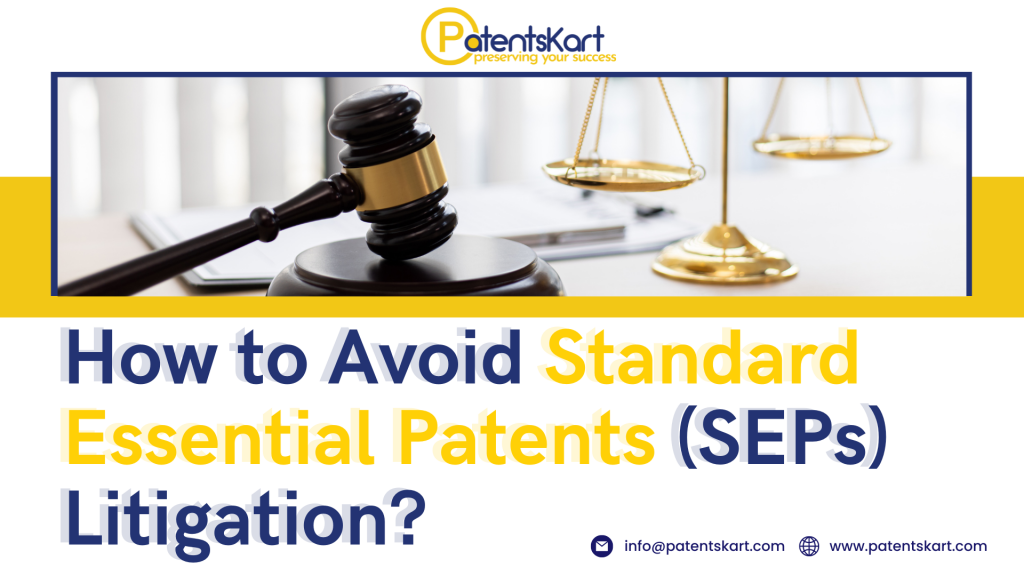Standard Essential Patents (SEPs) are essential to the creation and uptake of numerous industry standards in the continuously changing technology environment of today. SEPs are patents that protect key innovations required to put a specific standard into practice. While encouraging innovation and fostering interoperability, these patents also have the potential to spark costly legal conflicts and litigation. The goal of this blog is to offer useful information about proactive ways that businesses can manage the difficulties of SEPs and reduce the possibility of legal action.
Conduct extensive research on patents:
It is crucial to undertake thorough patent research to find any pertinent SEPs before creating or implementing a new technology. Companies can analyze the risk of future infringement by looking at the current patent landscape to acquire a comprehensive grasp of the patents held by others in their area. This phase enables businesses to choose the technology they want to use in their goods or services with knowledge, which lowers the risk of SEP-related legal disputes.
Utilize processes for standardization:
One efficient method of reducing the danger of SEP litigation is to participate in standardization activities. Companies can have an impact on standardization and make sure that their proprietary innovations are taken into account by actively participating in standard-setting organizations (SSOs). This participation offers the chance to negotiate fair and acceptable license conditions for SEPs, preventing pending legal conflicts. By getting involved early, businesses can also learn about the patent portfolios of future rivals and adjust their plans accordingly.
Decide on a licensing strategy:
To reduce the danger of SEP litigation, a complete licensing strategy must be created. It is customary in the sector to provide SEP licenses on FRAND (fair, reasonable, and non-discriminatory) terms. Companies can encourage collaboration and avert legal problems by providing licenses to third parties under FRAND conditions. The likelihood of infringement lawsuits or counterclaims is decreased when license agreements are established in advance. For the sake of preserving goodwill with prospective licensees, it is crucial to thoroughly analyze the licensing terms and bargain in good faith.
Also Read: What Role Does FRAND Play in Standard Essential Patent Licensing?
Consult a lawyer:
It can be difficult to navigate the complexity of SEP licensing and patent law. It is strongly advised to seek legal counsel from knowledgeable SEP-focused intellectual property attorneys. These experts can offer insightful advice on SEP portfolio review, licensing discussions, and conflict resolution tactics. Early legal involvement can assist businesses in avoiding potential traps and aggressively addressing any potential patent-related difficulties.
Look into alternate dispute resolution options:
If there are any SEP-related disputes, looking into alternative dispute resolution (ADR) options can be a quicker and more affordable answer than starting a protracted legal battle. To preserve business relationships and reduce financial and reputational risks, parties may choose to use mediation, arbitration, or another type of ADR to help them come to an amicable conclusion. Compared to typical court proceedings, ADR techniques can provide flexibility, confidentiality, and a quicker result.
Share Intellectual Property and Work:
Collaboration and the sharing of intellectual property (IP) can act as a deterrent to SEP litigation. Companies can gain access to the technologies they need while avoiding legal issues with intellectual property infringement by entering into cross-licensing arrangements with other enterprises. By combining patents through consortiums or patent pools, it is possible to make it easier for people to get SEPs on reasonable terms and decrease the risk of legal disputes. Such cooperative strategies support the creation of industry standards, cooperation, and innovation.
Also Read: Are All Standard Essential Patents (SEPs) Actually Essential?







